星期天week1,2
2015工作周历记事版 (带农历,两周一页,可打印)

8
寒露
9
廿七
10
廿八
11
廿九
休 休 休
12
三十
班
15
初三
13
9月大
14
初二
16
初四
17
初五
18
初六
10/11月
星期一Monday
第43/44周 星期二Tuesday
2015
星期三Wendnesday 星期四Thursday
农历乙未年
星期五Friday 星期六Saturday 星期日Sunday
19
2
十六
3
十七
4
十八
5
十九
6
芒种
7
廿一
8
廿二
9
廿三
10
廿四
11
廿五
12
廿六
13
廿七
14
廿八
6月
星期一Monday
第25/26周 星期二Tuesday
2015
星期三Wendnesday ห้องสมุดไป่ตู้期四Thursday
农历乙未年
星期五Friday 星期六Saturday 星期日Sunday
15
廿九
16
5月大
17
初七
20
初八
21
重阳节
22
初十
23
十一
24
霜降
25
十三
26
十四
27
十五
28
十六
29
十七
30
十八
31
十九
1
二十
11月
星期一Monday
第45/46周 星期二Tuesday
工作周历 A 纸一 周
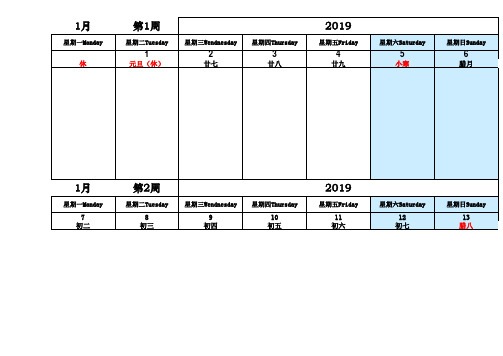
第41周
星期二Tuesday
星期三Wendnesday 星期四Thursday
2019
星期五Friday
星期六Saturday
星期日Sunday
星期一Monday
7 重阳节
星期二Tuesday
8 寒露
星期三Wendnesday
9 十一
星期四Thursday
10 十二
星期五Friday
1月
星期一Monday
休
第1周
星期二Tuesday
1
元旦(休)
星期三Wendnesday
2
廿七
星期四Thursday
3
廿八
2019
星期五Friday
4
廿九
星期六Saturday
5
小寒
星期日Sunday
6
腊月
1月
星期一Monday 7
初二
第2周
星期二Tuesday 8
初三
星期三Wendnesday
9 初四
星期四Thursday
6 芒种
2019
星期五Friday 7
端午节
星期六Saturday
8 初六
星期日Sunday
9 初七
6月
星期一Monday 10
第24周
星期二Tuesday 11
星期三Wendnesday 12
星期四Thursday 13
2019
星期五Friday 14
星期六Saturday 15
星期一Monday 25
廿一
第9周
星期二Tuesday 26
廿二
星期三Wendnesday
周一 周二 周三 周四 周五 周六

周一周二周三周四周五周六1 化学语文英语数学化学生物2语文英语化学物理英语化学3 语文数学数学英语语文化学4生物物理语文历史物理英语5英语化学物理语文数学英语中午6体育英语通生物体育数学7物理音乐政治地理地理数学8 数学历史生物数学自习物理9自习自习自习自习自习物理晚课语文数学化/生物理英语语文周一周二周三周四周五周六1 化学语文英语数学化学生物2语文英语化学物理英语化学3 语文数学数学英语语文化学4生物物理语文历史物理英语5英语化学物理语文数学英语中午6体育英语通生物体育数学7物理音乐政治地理地理数学8 数学历史生物数学自习物理9自习自习自习自习自习物理晚课语文数学化/生物理英语语文周一周二周三周四周五周六1 化学语文英语数学化学生物2语文英语化学物理英语化学3 语文数学数学英语语文化学4生物物理语文历史物理英语5英语化学物理语文数学英语中午6体育英语通生物体育数学7物理音乐政治地理地理数学8 数学历史生物数学自习物理9自习自习自习自习自习物理晚课语文数学化/生物理英语语文周一周二周三周四周五周六1 化学语文英语数学化学生物2语文英语化学物理英语化学3 语文数学数学英语语文化学4生物物理语文历史物理英语5英语化学物理语文数学英语中午6体育英语通生物体育数学7物理音乐政治地理地理数学8 数学历史生物数学自习物理9自习自习自习自习自习物理晚课语文数学化/生物理英语语文周一周二周三周四周五周六1 化学语文英语数学化学生物2语文英语化学物理英语化学3 语文数学数学英语语文化学4生物物理语文历史物理英语5英语化学物理语文数学英语中午6体育英语通生物体育数学7物理音乐政治地理地理数学8 数学历史生物数学自习物理9自习自习自习自习自习物理晚课语文数学化/生物理英语语文周一周二周三周四周五周六1 化学语文英语数学化学生物2语文英语化学物理英语化学3 语文数学数学英语语文化学4生物物理语文历史物理英语5英语化学物理语文数学英语中午6体育英语通生物体育数学7物理音乐政治地理地理数学8 数学历史生物数学自习物理9自习自习自习自习自习物理晚课语文数学化/生物理英语语文周一周二周三周四周五周六1 化学语文英语数学化学生物2语文英语化学物理英语化学3 语文数学数学英语语文化学4生物物理语文历史物理英语5英语化学物理语文数学英语中午6体育英语通生物体育数学7物理音乐政治地理地理数学8 数学历史生物数学自习物理9自习自习自习自习自习物理晚课语文数学化/生物理英语语文周一周二周三周四周五周六1 化学语文英语数学化学生物2语文英语化学物理英语化学3 语文数学数学英语语文化学4生物物理语文历史物理英语5英语化学物理语文数学英语中午6体育英语通生物体育数学7物理音乐政治地理地理数学8 数学历史生物数学自习物理9自习自习自习自习自习物理晚课语文数学化/生物理英语语文周一周二周三周四周五周六1 化学语文英语数学化学生物2语文英语化学物理英语化学3 语文数学数学英语语文化学4生物物理语文历史物理英语5英语化学物理语文数学英语中午6体育英语通生物体育数学7物理音乐政治地理地理数学8 数学历史生物数学自习物理9自习自习自习自习自习物理晚课语文数学化/生物理英语语文周一周二周三周四周五周六1 化学语文英语数学化学生物2语文英语化学物理英语化学3 语文数学数学英语语文化学4生物物理语文历史物理英语5英语化学物理语文数学英语中午6体育英语通生物体育数学7物理音乐政治地理地理数学8 数学历史生物数学自习物理9自习自习自习自习自习物理晚课语文数学化/生物理英语语文。
人教版二年级英语下册知识点
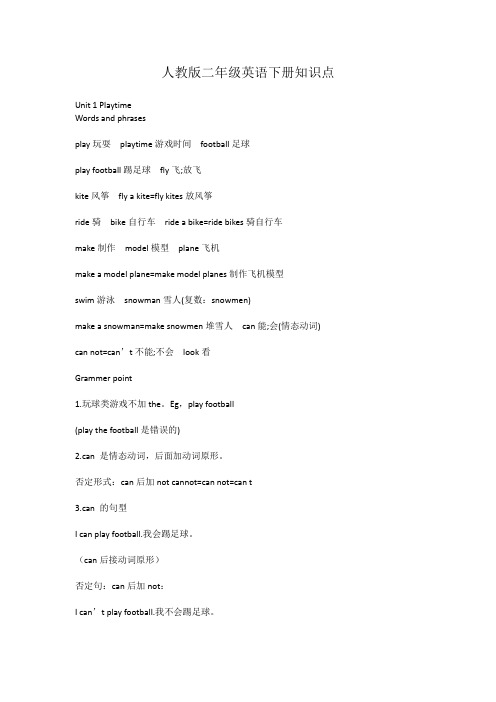
人教版二年级英语下册知识点Unit 1 PlaytimeWords and phrasesplay玩耍playtime游戏时间football足球play football踢足球fly飞;放飞kite风筝fly a kite=fly kites放风筝ride骑bike自行车ride a bike=ride bikes骑自行车make制作model模型plane飞机make a model plane=make model planes制作飞机模型swim游泳snowman雪人(复数:snowmen)make a snowman=make snowmen堆雪人can能;会(情态动词) can not=can’t不能;不会look看Grammer point1.玩球类游戏不加the。
Eg,play football(play the football是错误的)2.can 是情态动词,后面加动词原形。
否定形式:can后加not cannot=can not=can t3.can 的句型I can play football.我会踢足球。
(can后接动词原形)否定句:can后加not:I can’t play football.我不会踢足球。
一般疑问句:把can提前,并大写,I变You,别忘记。
Can you play football?你会踢足球吗?肯定回答:Yes,I can.是的,我会。
否定回答:No,I can’t.不,我不会。
特殊疑问句:I can play football.划线提问:What can you do?你会做什么? Sentences1.Can you swim?你会游泳吗?2.Can you play football?你会踢足球吗?3.Can you fly a kite?你会放风筝吗?4.Can you ride a bike?你会骑自行车吗?5.Can you make a model plane?你会制作飞机模型吗?6.Can you make a snowman?你会堆雪人吗?7.Sorry,I can t.对不起,我不会。
2024四(下)英语(译林版)全册语法考点整理

四年级下册英语语法考点整理Unit1Our school subjects语法考点1.what subjects和what lessons的区别及考点what后面的学科和课要加s;即what subjects和what lessons; what subjects意思是科目、学科,subjects一般和like连用;例:What subjects do you like?你喜欢什么学科?what lessons意思是具体的什么课,lessons一般和have连用;例:What lessons do you have?你有什么课?与have连用;you have this term(学期)?这学期你有什么科目啊?Unit2After school语法考点1.星期考点星期一到星期天分别是:星期一Monday;星期二Tuesday;星期三Wednesday;星期四Thursday;星期五Friday;星期六Saturday;星期天Sunday。
英语中,一个星期的第一天是星期天;is the first(第一)day of a week(一周).在星期几前面的介词用on;即on+星期几;在星期几的上午或下午直接在星期后加morning或afternoon;正确用法:on Sunday morning在星期天上午(√)错误用法:in the morning on Sunday(×)④对星期几提问特殊疑问词用What day;回答星期几用It's+星It’s time for+名词例:It's time for school.It's time to+动词词组例:It’s time to go to school.例:It’s time for PE(名词).It’s time to have(动词)a PE lesson.It’s time for lunch(名词).It’s time to have(动词)lunch.3.some、any考点①some在部分疑问句和否定句中要改为any②用于征求对方意见并且希望得到肯定答复的时候,some无须改为any;总结为以下3种情况:(1)Would you like some...?(2)What/How about some...?(3)Can I①like后接可数名词要用复数形式;例:like mangoes②★能力题:like后接动词时要用动词ing形式;例:like playing basketball.Unit3My day语法考点1.时间介词in,on,at的考点★in考点①四季前介词用in,中间不加任何冠词。
周一至周日单词
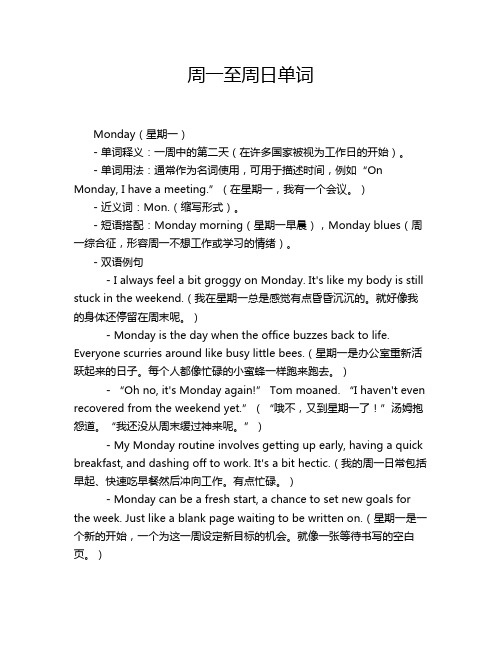
周一至周日单词Monday(星期一)- 单词释义:一周中的第二天(在许多国家被视为工作日的开始)。
- 单词用法:通常作为名词使用,可用于描述时间,例如“On Monday, I have a meeting.”(在星期一,我有一个会议。
)- 近义词:Mon.(缩写形式)。
- 短语搭配:Monday morning(星期一早晨),Monday blues(周一综合征,形容周一不想工作或学习的情绪)。
- 双语例句- I always feel a bit groggy on Monday. It's like my body is still stuck in the weekend.(我在星期一总是感觉有点昏昏沉沉的。
就好像我的身体还停留在周末呢。
)- Monday is the day when the office buzzes back to life. Everyone scurries around like busy little bees.(星期一是办公室重新活跃起来的日子。
每个人都像忙碌的小蜜蜂一样跑来跑去。
)- “Oh no, it's Monday again!” Tom moaned. “I haven't even recovered from the weekend yet.”(“哦不,又到星期一了!”汤姆抱怨道。
“我还没从周末缓过神来呢。
”)- My Monday routine involves getting up early, having a quick breakfast, and dashing off to work. It's a bit hectic.(我的周一日常包括早起、快速吃早餐然后冲向工作。
有点忙碌。
)- Monday can be a fresh start, a chance to set new goals for the week. Just like a blank page waiting to be written on.(星期一是一个新的开始,一个为这一周设定新目标的机会。
周次查询
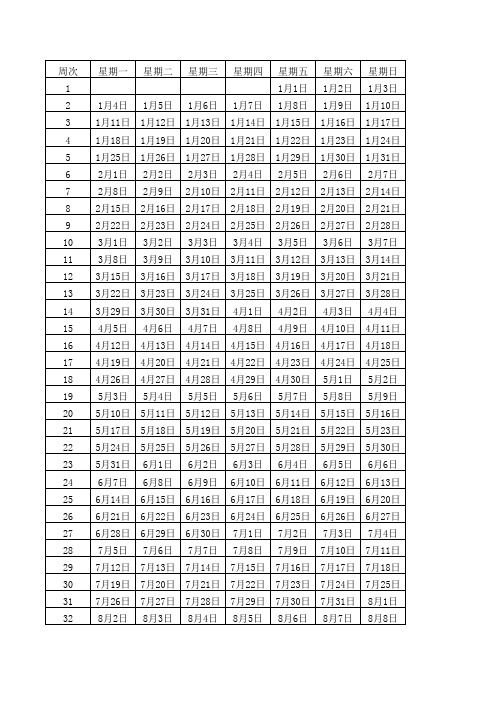
1月4日 1月11日 1月18日 1月25日 2月1日 2月8日 2月15日 2月22日 3月1日 3月8日 3月15日 3月22日 3月29日 4月5日 4月12日 4月19日 4月26日 5月3日 5月10日 5月17日 5月24日 5月31日 6月7日 6月14日 6月21日 6月28日 7月5日 7月12日 7月19日 7月26日 8月2日
1月7日 1月14日 1月21日 1月28日 2月4日 2月11日 2月18日 2月25日 3月4日 3月11日 3月18日 3月25日 4月1日 4月8日 4月15日 4月22日 4月29日 5月6日 5月13日 5月20日 5月27日 6月3日 6月10日 6月17日 6月24日 7月1日 7月8日 7月15日 7月22日 7月29日 8月5日
周次 1 2 3 4 5 6 7 8 9 10 11 12 13 14 15 16 17 18 19 20 21 22 23 24 25 26 27 28 29 30 31 32
星期一
星期二
星期三
星期四
星期五 1月1日
星期六 1月2日 1月9日 1月16日 1月23日 1月30日 2月6日 2月13日 2月20日 2月27日 3月6日 3月13日 3月20日 3月27日 4月3日 4月10日 4月17日 4月24日 5月1日 5月8日 5月15日 5月22日 5月29日 6月5日 6月12日 6月19日 6月26日 7月3日 7月10日 7月17日 7月24日 7月31日 8月7日
1月6日 1月13日 1月20日 1月27日 2月3日 2月10日 2月17日 2月24日 3月3日 3月10日 3月17日 3月24日 3月31日 4月7日 4月14日 4月21日 4月28日 5月5日 5月12日 5月19日 5月26日 6月2日 6月9日 6月16日 6月23日 6月30日 7月7日 7月14日 7月21日 7月28日 8月4日
2020年译林版英语四年级下册1-8单元重要考点梳理
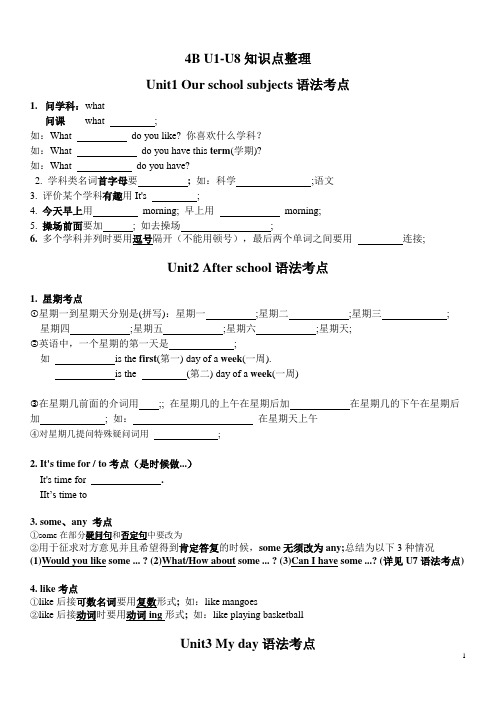
4B U1-U8知识点整理Unit1 Our school subjects语法考点1.问学科:what问课what ;如:What do you like? 你喜欢什么学科?如:What do you have this term(学期)?如:What do you have?2. 学科类名词首字母要; 如:科学;语文3. 评价某个学科有趣用It's ;4. 今天早上用morning; 早上用morning;5. 操场前面要加; 如去操场;6. 多个学科并列时要用逗号隔开(不能用顿号),最后两个单词之间要用连接;Unit2 After school语法考点1. 星期考点①星期一到星期天分别是(拼写):星期一;星期二;星期三;星期四;星期五;星期六;星期天;②英语中,一个星期的第一天是;如is the first(第一) day of a week(一周).is the (第二) day of a week(一周)③在星期几前面的介词用;; 在星期几的上午在星期后加在星期几的下午在星期后加; 如:在星期天上午④对星期几提问特殊疑问词用;2. It's time for / to考点(是时候做...)It's time for.I It’s time to3. some、any 考点①some在部分疑问句和否定句中要改为②用于征求对方意见并且希望得到肯定答复的时候,some无须改为any;总结为以下3种情况(1)Would you like some ... ? (2)What/How about some ... ? (3)Can I have some ...? (详见U7语法考点)4. like考点①like后接可数名词要用复数形式; 如:like mangoes②like后接动词时要用动词ing形式; 如:like playing basketball1. 时间介词in, on,at 的考点in考点①四季前介词用in, 如:in spring②in还可以表示在“某段时间内”,如:在早晨in the morning 在下午in the afternoon 在晚上in the eveningon考点①在星期几前介词用on ,如on Sunday, on Monday②在星期几的上午/下午/晚上用:on + 星期几+ 上午/下午/晚上如:on Saturday morning 在星期六早上③在晴朗的一天介词用on, 如:on a sunny day 在晴朗的一天at考点①在“几点”前介词用at, 如:at seven thirty②固定搭配:at night 在夜里2. 两种问时间的表达法:What time is it (now)? = What’s the time? (现在)几点了?回答统一用:It's + 几点Array3. When考点When 询问的是时间范围回答一般用at;如:—你早上什么时候吃早饭?When do you have breakfast in the morning?—我在八点半吃早饭。
2014周历实用版_(带农历_两周、单周一页_可打印)

9.1 初八
2 初九
3 初十
4 十一
5 十二
6 十三
7 十四
9月
星期一Monday 8
中秋节白露
第37/38周 星期二Tuesday 9 十六
2014
星期三Wendnesday 星期四Thursday 10 教师节 11 十八
农历甲午年
星期五Friday 12 十九 星期六Saturday 13 二十 星期日Sunday 14 廿一
28 廿九
29 <四月>
30 初二
5.1 劳动节
2 初四
3 初五
4 青年节
5月
星期一Monday 5 立夏
第19/20周 星期二Tuesday 6 初八
2014
星期三Wendnesday 星期四Thursday 7 初九 8 初十
农历甲午年
星期五Friday 9 十一 星期六Saturday 10 十二 星期日Sunday 11 母亲节
7 小暑
8 十二
9 十三
10 十四
11 十五
12 十六
13 十七
7月
星期一Monday 14 十八
第29/30周 星期二Tuesday 15 十九
2014
星期三Wendnesday 星期四Thursday 16 二十 17 廿一
农历甲午年
星期五Friday 18 廿二 星期六Saturday 19 廿三 星期日Sunday 20 廿四
29 初六
30 初七
10.1 国庆节
2 重阳节
3 初十
4 十一
5 十二
10月
星期一Monday 6 十三
第41/42周 星期二Tuesday 7 十四
五年级上册英语手抄报第2单元
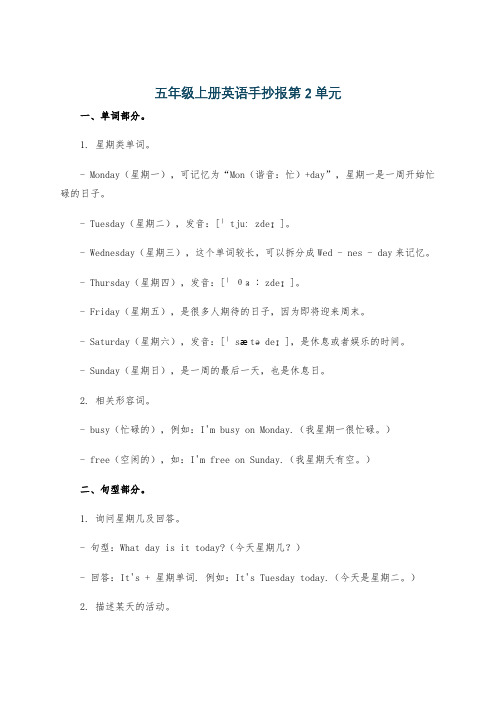
五年级上册英语手抄报第2单元一、单词部分。
1. 星期类单词。
- Monday(星期一),可记忆为“Mon(谐音:忙)+day”,星期一是一周开始忙碌的日子。
- Tuesday(星期二),发音:[ˈtjuːzdeɪ]。
- Wednesday(星期三),这个单词较长,可以拆分成Wed - nes - day来记忆。
- Thursday(星期四),发音:[ˈθɜːzdeɪ]。
- Friday(星期五),是很多人期待的日子,因为即将迎来周末。
- Saturday(星期六),发音:[ˈsætədeɪ],是休息或者娱乐的时间。
- Sunday(星期日),是一周的最后一天,也是休息日。
2. 相关形容词。
- busy(忙碌的),例如:I'm busy on Monday.(我星期一很忙碌。
)- free(空闲的),如:I'm free on Sunday.(我星期天有空。
)二、句型部分。
1. 询问星期几及回答。
- 句型:What day is it today?(今天星期几?)- 回答:It's + 星期单词. 例如:It's Tuesday today.(今天是星期二。
)2. 描述某天的活动。
- 句型:I have + 学科/活动 + on + 星期单词.- 例如:I have English on Monday.(我星期一有英语课。
)- I play football on Saturday.(我星期六踢足球。
)三、语法点。
1. 一般现在时在星期表达中的用法。
- 在描述星期几的日常活动时,我们常用一般现在时。
当主语是第一人称(I/we)、第二人称(you)或者复数主语时,动词用原形。
例如:We have music on Friday.(我们星期五有音乐课。
)- 当主语是第三人称单数(he/she/it)时,动词要加 - s或者 - es。
例如:He has Chinese on Wednesday.(他星期三有语文课。
星期一到星期日的英文意思

星期一到星期日的英文意思星期日Sunday星期一Monday星期二Tuesday星期三Wednesday星期四Thursday星期五Friday星期六SaturdaySunday(星期日)日尔曼民族和古罗马人一样,有时也用日月星辰来命名一星期中的某一天。
作为一星期的第一天,Sunday在古时候是献给太阳的,古英语里拼作Sunnandaeg。
犹太教的安息日定在星期六,基督教之所以改星期日为安息日,是因为耶稣在这一天复活。
约从公元4世纪起,罗马天主教会就将Sunday定为假日,在这一天禁止任何人工作,教徒都得停止一切娱乐活动,上教堂去做礼拜。
Monday(星期一)在古罗马神话中,月亮为太阳之妻。
因此,在一星期中也必须有一天是献给月亮的。
他们把一星期的第二天叫做Lunaedies,盎格鲁———撒克逊人借译了该词,作Monandaeg,意即Moon day,现代英语作Monday。
Tuesday(星期二)在北欧神话中,有一个战神名叫Tyr,相当于罗马神话里的Mars。
当狼精Fenrir在人间作恶时,Tyr自告奋勇前往擒拿,在绑缚狼精时,一只手被咬掉了。
Tyr在古英语中拼作Tiw,从Tiw产生了古英语词Tiwesdaeg,意即the day of Tiw,这就是现代英语Tuesday的原始形式。
Wednesday(星期三)在古英语中原作Modnesdaeg,意即Woden's day。
Woden乃日尔曼战神Tyr之父,相当于罗马神话里的商业神Mercury。
古罗马人以Mercury来命名星期三,把星期三叫做Mercurii dies。
其实,英语Wodnesdaeg就是译自该拉丁词,只是在借译时Mercury换成了Woden而已。
Thursday(星期四)在北欧神话中,最有权势、最勇敢的神要数雷神Thor。
他相当于罗马神话里的主神Jupiter /Jove。
当Thor驾着公山羊拉的战车奔驰而过时,天空顿时雷轰电闪。
周一到周末英语单词
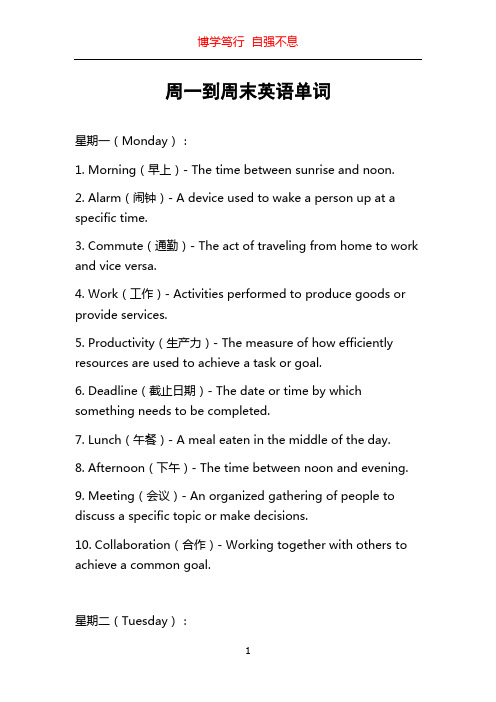
周一到周末英语单词星期一(Monday):1. Morning(早上)- The time between sunrise and noon.2. Alarm(闹钟)- A device used to wake a person up at a specific time.3. Commute(通勤)- The act of traveling from home to work and vice versa.4. Work(工作)- Activities performed to produce goods or provide services.5. Productivity(生产力)- The measure of how efficiently resources are used to achieve a task or goal.6. Deadline(截止日期)- The date or time by which something needs to be completed.7. Lunch(午餐)- A meal eaten in the middle of the day.8. Afternoon(下午)- The time between noon and evening.9. Meeting(会议)- An organized gathering of people to discuss a specific topic or make decisions.10. Collaboration(合作)- Working together with others to achieve a common goal.星期二(Tuesday):1. Breakfast(早餐)- The first meal of the day, usually eaten in the morning.2. Email(电子邮件)- A digital message sent and received through an electronic communication system.3. Presentation(演示)- A visual or verbal display of information or ideas.4. Training(培训)- The process of teaching and learning specific skills or knowledge.5. Project(项目)- A planned undertaking with specific goals and timelines.6. Deadline(截止日期)- The date or time by which something needs to be completed.7. Teamwork(团队合作)- The collaborative effort of a group of individuals to achieve a common goal.8. Efficiency(效率)- The ability to accomplish a task with minimum time and effort.9. Problem-solving(解决问题)- The process of finding solutions to difficulties or challenges.10. Happy hour(欢乐时光)- A period of time, usually in the late afternoon or early evening, where drinks are offered at discounted prices.星期三(Wednesday):1. Meeting(会议)- An organized gathering of people to discuss a specific topic or make decisions.2. Agenda(议程)- A list of items to be discussed or acted upon during a meeting.3. Presentation(演示)- A visual or verbal display of information or ideas.4. Discussion(讨论)- The act of exchanging opinions or ideas among a group of people.5. Deadline(截止日期)- The date or time by which something needs to be completed.6. Break(休息)- A short period of time during which a person pauses from work or other activities.7. Planning(规划)- The process of determining the course of action to achieve specific goals.8. Decision(决策)- A choice made between different options or possibilities.9. Delegation(委托)- The transfer of authority or responsibility to another person.10. Time management(时间管理)- The process of planning and organizing one's time effectively.星期四(Thursday):1. Morning(早上)- The time between sunrise and noon.2. Deadline(截止日期)- The date or time by which something needs to be completed.3. Report(报告)- A written or spoken account of an event, situation, or investigation.4. Analysis(分析)- The process of examining something in detail to understand its components or structure.5. Feedback(反馈)- Information given to a person about their performance or behavior.6. Progress(进展)- The forward movement towards achieving a goal or objective.7. Lunch(午餐)- A meal eaten in the middle of the day.8. Afternoon(下午)- The time between noon and evening.9. Presentation(演示)- A visual or verbal display of information or ideas.10. Collaboration(合作)- Working together with others to achieve a common goal.星期五(Friday):1. Morning(早上)- The time between sunrise and noon.2. Meeting(会议)- An organized gathering of people to discuss a specific topic or make decisions.3. Brainstorm(集思广益)- The process of generating creative ideas or solutions through group discussion.4. Creativity(创造力)- The ability to think and generate original ideas or solutions.5. Break(休息)- A short period of time during which a person pauses from work or other activities.6. Networking(社交)- The act of connecting and building relationships with people for professional or social purposes.7. Afternoon(下午)- The time between noon and evening.8. Prioritization(优先级排序)- The process of determining the order in which tasks or goals should be addressed.9. Relaxation(放松)- The act of taking a break or engaging in activities that reduce stress or promote well-being.10. Weekend(周末)- The period of time between Friday evening and Sunday night, typically used for leisure and recreation.星期六和星期天(Saturday and Sunday):1. Weekend(周末)- The period of time between Friday evening and Sunday night, typically used for leisure and recreation.2. Relaxation(放松)- The act of taking a break or engaging in activities that reduce stress or promote well-being.3. Family(家庭)- A group consisting of parents and their children, living together as a unit.4. Friends(朋友)- People whom one knows, likes, and trusts.5. Hobbies(爱好)- Activities done during one's free time for enjoyment or relaxation.6. Rest(休息)- The act of ceasing work or activity to regain strength or energy.7. Netflix(在线视频平台)- A streaming service that offers a wide variety of movies, TV shows, and documentaries.8. Reading(阅读)- The act of interpreting written or printed material.9. Nature(大自然)- The physical world and its phenomena, including plants, animals, and landscapes.10. Recharge(充电)- The act of replenishing or restoring energy or vitality.。
- 1、下载文档前请自行甄别文档内容的完整性,平台不提供额外的编辑、内容补充、找答案等附加服务。
- 2、"仅部分预览"的文档,不可在线预览部分如存在完整性等问题,可反馈申请退款(可完整预览的文档不适用该条件!)。
- 3、如文档侵犯您的权益,请联系客服反馈,我们会尽快为您处理(人工客服工作时间:9:00-18:30)。
原文:【1】星期天,我在家有些闲空时,常常站在窗前看看街上的行人。
兴高采烈的孩子们手挽着手走着,红领巾随风飘摆。
看到他们我就想起我童年的一段苦难经历。
我出生在X国。
我刚刚学走路就突然得了小儿麻痹症,双腿失去了知觉。
父母卖了家里的几件东西把我送进医院,希望能治好我的病。
但是治疗无效。
大夫宣称我要终身残废。
【2】我幼小的时候,母亲背着我。
但是等我渐渐长大了,我对自己的不幸越来越感到难过。
不知多少次我对母亲说:“妈妈,我要走路,让我站起来吧。
”这使我母亲十分伤心。
虽然我还小,可是我老是想:“要是能走路,那该多快活,那怕走一次,甚至一步也好。
【3】当时这是我的唯一愿望。
这个愿望真让我父母的心都碎了。
我的父母根本没钱,可是仍然想办法把我送到每一家有名的医院。
可是得到的回答到处都一样--我的病是治不好的。
【4】我的生活就是这样一年一年地熬着。
但我始终没有放弃能治愈的希望。
等我长大一点,我产生了一种想法--我是中国人,我的病准能在中国治好。
我不断地要求父母带我回国。
我十岁那年,全家回到了我日夜想念的祖国。
当我被放在祖国的温暖的土地上,我的兴奋和喜悦是难以言表的。
可我是个残废,不能在祖国的土地上站着。
难以忍受的痛苦压在心头。
【5】不久我就被送往一家儿童医院。
几位医生对我进行了彻底的检查。
我记不得他们检查了多长时间。
我用颤抖的声音对他们说:“治治我吧,让我站起来吧。
”这时我脑海里浮现出一串串痛苦的回忆。
我回忆起在X国几次被送到医院去的情景。
检查完毕了。
一位老医生笑着对我说:“我看你还能走路,最好你现在就住院吧。
”我简直不能相信自己的耳朵。
我有生以来第一次落下欢乐的眼泪。
【6】几天以后,我的腿动了手术。
医生和护士就象照顾自己的女儿和妹妹一样照顾我。
那位老医生每天来到我的床边问我感觉怎样,胃口好不好。
又过了十几天,我的腿开始变得温暖起来。
为了使我尽快地恢复功能,医院为我进行了中西医会诊。
除了打针和吃药外,医生们还为我针灸和按摩。
三个月后,我已能平稳地站在地上,但是仍不能迈步。
护士们为我特制了一双鞋。
她们帮我穿上,扶我站起来。
几位年轻的护士每天不厌其烦地带我到花园,扶我练习走路。
花园里百花盛开,阳光灿烂。
每当来到这里,我的心里就说不出的高兴。
一天,我突然觉得我的腿能独立走动,一步,又一步!我不由得高兴得喊出来:“我能走了,我的腿能走了。
”从那天开始,我坚持独立行走。
【7】X国的医学很先进,但没能治好我的病。
我在X国生活了十年也没能在该国的土地上走过一步。
如今我已能在祖国的土地上阔步而行。
是祖国的亲人使我获得了充满幸福和希望的生活。
参考译文及说明:【1】On Sundays, when I have a few moments to spare, I often stand before the window to look at the people striding along the street. Joyous children walk arm in arm with their red scarves fluttering in the breeze. As I look at them, I reflect on (bring to mind, call to mind) the bitter experience of my childhood. I was born in country X. When I was just learning to walk, I was suddenly attacked with infantile paralysis (poliomyelitis, polio). My legs became numbed. My parents sold some household goods (articles) to put (send) me to a hospital, hoping to see me stand on my feet again. But there was no sight (sign) of improvement. And in the end the doctors pronounced me a life-long cripple.【2】When I was a baby, (my) mother carried me on her back. But when I grew older I became more oppressed with my misfortune (My misfortune weighed more heavily on my mind). I don’t know (remember) how many times I pained m y mother by saying “Mama, I want to walk. Please make me standon my feet.” Young as I was, I kept wondering “How happy I would be if I could walk, even once, even one step.”【3】It was my only wish. Indeed i t broke my parents’ hearts. My parents were by no means well-off,but they did everything in their power to take me to every known hospital. But the answer was the same everywhere--My case was incurable (Mine was an incurable case) .【4】Life dragged on like this for me year after year. But I never gave up the hope of being cured. When I grew older, I got an idea--Since I was a Chinese, my disease would surely be cured in China. I kept on asking my parents to bring me back to my (the) motherland. When I was ten years old, my family returned to my (the) motherland for which I had longed day and night. When I was placed on the soil ofmy (the) motherland, my joy and excitement were too great for words. Being a cripple (A cripple), I could not, however, stand on the tender (warm) soil of my (the) motherland. An unutterable grief gnawed at my heart. (李改译)Practice 2 (Continued from Practice 1)参考译文及说明【5】Very soon I was taken to a children’s hospital. Several doctors gave me (my legs) a thorough examination (examined me [my legs] thoroughly). I don’t rem ember how long they examined me (the examination lasted). I said to them in (with) a trembling voice: “Doctors, please cure my legs, make me stand on my feet.” At that moment a train of bitter memories of those days when I was taken to one hospital after another in country X came into my mind. After the examination, an old (an elderly, a veteran) doctor said with a smile: “ I think you will be able to walk. You’d better stay in the hospital now.” I could hardly believe my ears. For the first time in my life, tears of joy rolled down my cheeks.【6】Several days later my legs were operated on. The doctors and nurses looked after me as if I were their own daughter and sister. Every day the old (elderly, veteran) doctor came to my bedside and asked me how I felt and if I had a good appetite. After ten more days, (Another ten days had passed.) my (My) legs began to turn warm. In order to enable me to recover quickly, the hospital held a group consultation of doctors practicing traditional Chinese medicine and doctors practicing western medicine. In addition to injection and medicine, thedoctors gave me acupuncture and massage treatments. Three months later, I could stand quite firmly on the ground, but I could not take any step forward. The nurses made a special pair of shoes for me. They helped me on with the shoes and brought me to my feet. Every day some young nurses showed the greatest patience in taking me to the garden and helping me practice walking. In the garden all kinds of flowers were in full bloom under the bright sun. My heart leapt with joy each time I came there. One day I suddenly felt my legs moving forward. One step and then another. I could not help crying for joy (I cried for joy in spite of myself): “I can walk. My legs are carrying me.” From th en on I kept on practicing walking independently (by myself).【7】My disease was not cured in country X although medical science was advanced in that country. I lived in country X for ten years. But I never took a step on its soil. Now I could stride on the soil of my motherland. It was the dear ones of my motherland that gave me a life of happiness and hope. (李改译)1.“几位医生对我进行了彻底的检查。
